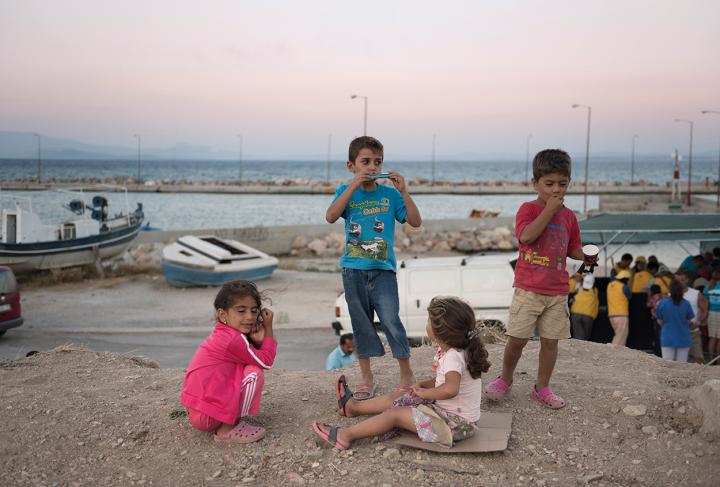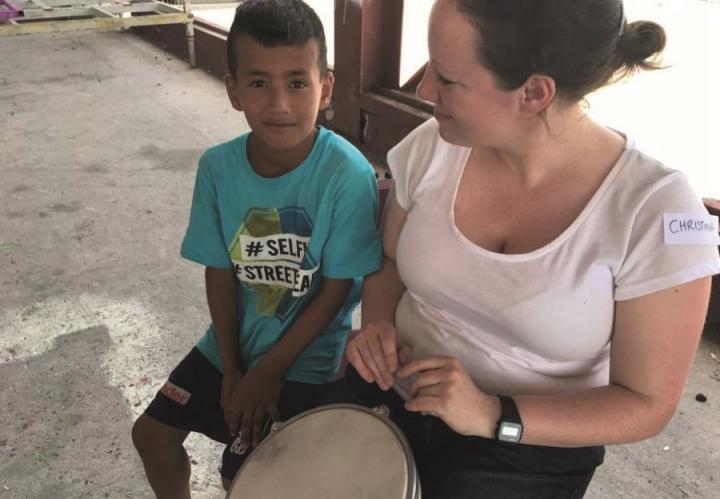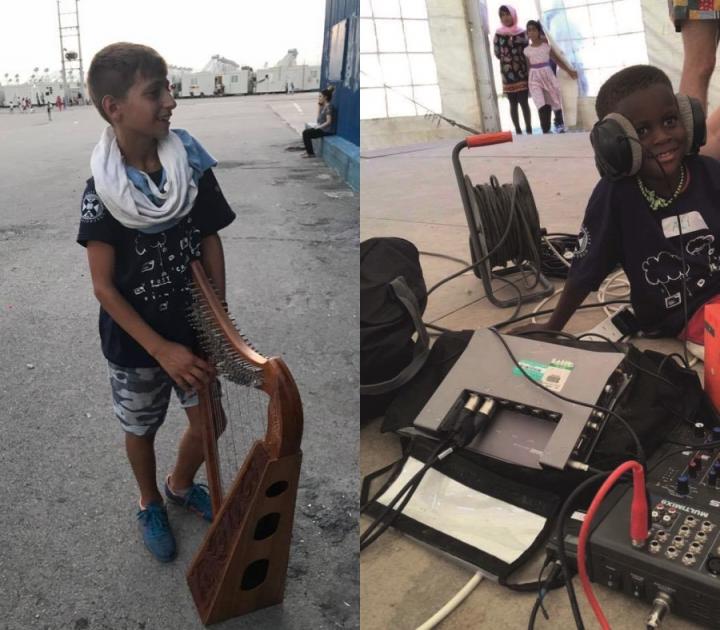The language of music
A graduate tells her story about bringing music workshops to children in Greece’s refugee camps.

By Christina Bain
The refugee crisis has shocked the world. The media has been flooded with images of waves of humanity being driven from their homes and crossing treacherous seas in the hope of finding some relief from the torments of war.
Refugee camps have sprung into existence along this long escape route. Greece, being the first EU landing point for many boats, has seen its population explode as more and more desperate people have clambered to its shores.

Two years ago, in my role as a tutor on the Music in the Community course at Edinburgh College of Art, I travelled to some of the refugee camps in Greeceand met the children who live in them.
Making connections
The Music in the Community Senior Lecturer, Dee Isaacs, had embarked on a pilot project with the National and Kapodistrian University of Athens, and led a team of music students and staff to work with the children in the camps, through a series of workshops.
Music in the Community emerges at an influential meeting point of a number of diverse concerns including: performance arts outreach, community development, creative arts therapies and conflict resolution.
Dee had composed a musical adaptation of Tin Forest by Helen Ward. The story is of a man who builds a forest from the junk around him. This becomes so beautiful that eventually the birds come, dropping seeds and bringing his forest to life. The students I was tutoring, had been developing their community workshop skills over two years on the course. Now, they could really put them into action seeing just how much impact music can have on children in the most desperate situations.
First impressions
We began working in Eleonas, a camp in Athens’ industrial district. Behind high walls and wire fences are hundreds of metal trailers surrounded by nothing but concrete. The trailers are luxurious compared to the tents and makeshift shelters that are found in the unofficial camps. As a relatively well-funded camp, there is food, water and air-conditioning – a necessity in temperatures of over 40°C.
In the centre of the compound is a large white tent where we gathered the children. The tent is an airless furnace but outside there is no shade and the sun is unrelenting. The children were full of energy and curiosity. It was instantly apparent that, even though the camp meets most of their basic needs, they were craving other interaction and stimuli. The hyperactive energy radiating from the children is common in those who have suffered trauma; this energy can be impulsive and unpredictable. Fights between the children are frequent and can spark out of nowhere. This ferocity dissipates as quickly as it arises and it is clear these children struggle to process and understand their emotions. They have been robbed of a structured environment in which to learn the boundaries of social interaction.
Music is a powerful tool for encouraging socialisation and positive interaction. It can be used to create a sense of calm and togetherness. As we watched the children it was clear that calm was not something they encountered often. We attempted to build a safe and positive space by performing for them and encouraging them to sit quietly and listen. The effect this had was startling. Some sat in perfect stillness, almost entranced, the silence lingering when the music had ended. This was a stark contrast to the hyperactivity and aggression that had preceded it.
We saw them come together and build a mural of colours and images, each contributing to the whole with such care and consideration, only to attempt to destroy their own beautiful work moments later.
The children took great joy in learning the songs together. Also within our team were artists and dancers who helped bring the story and music to life through creativity and movement. Still the difficulties these children face were always apparent and the fragility of the calm and focus we strived to create was all too evident. The openness of the tent meant distractions and interruptions were frequent. This made the construction of a safe, focused and creative environment incredibly difficult. These children are constantly surrounded by unpredictability; it is little wonder their moods can alter so swiftly.
We saw them come together and build a mural of colours and images, each contributing to the whole with such care and consideration, only to attempt to destroy their own beautiful work moments later. This sudden destructiveness is another indicator of trauma: the fear of losing anything they consider good and positive incites the traumatised child to destroy it themselves before anyone else can.
Temporary relief
In this life devoid of structure and focus, participating in the project and putting together our show brought some relief, however temporary, from the day-to-day hardships the children face. Children from Iraq, Iran, Syria, Sudan, Afghanistan and many more places, were able to sing, play and come together in a safe, neutral environment.

The joy the music brought was undeniable. This was exemplified by our visit to an unofficial camp set up in the disused airport – Elliniko. The authorities couldn’t grant us access to the inside so, undeterred, we stood in the old car park (now a sea of shanty structures) and brought out our instruments. We began playing. As if by magic children emerged from all around to listen. Their parents joined them and soon we were performing our show for an ever-growing group of camp residents. Dee led the audience in call and response participation – a technique used frequently in workshops – and suddenly we were all linked by musical interaction.
A return journey
We returned to Greece last summer, bringing a series of songs from all over the world to the camps. We had worked with these songs in Leith Walk Primary School in Edinburgh, as part of a production in March 2016 called Postcards from Our World. This production encouraged the local children to think of the concept of home and what that meant to them. Leith Walk has one of the most culturally diverse catchments in Edinburgh and the project encouraged the children to explore different countries and cultures through song. Many of the songs featured in Postcards were from the same countries as the refugee children in the Athens camps.
We took Postcards from Our World to Skaramagas, another camp near the Athens docks guarded by the navy. Miles from the city centre, surrounded by barbed wire fences, on another concrete wasteland are yet more rows of metal huts housing around 3,500 people.
The children gathered around our huge map of the world. Each song’s origin was marked and the children drew lines between them as we travelled the globe in our imaginations. Their enthusiasm for the songs was incredible. Their curiosity was boundless as they explored the music and instruments. We had to take great care as their eagerness verged on the brink of chaos. Words are not a reliable form of communication in a group of at least five native languages, but through different musical moods we were able to direct the energy, maintain focus and transcend the language barrier. We saw how music facilitates positive shared experience and creativity in places where such interactions can be rare.
Seeing the children – many of them unaccompanied minors – was shocking. Some that we had met in 2016 were still there. Those that had told us tales of how they were “on their way to Germany/UK/France tomorrow” were still here a year later. This stagnancy is deeply demoralising for them. They have made it to Europe; they are safe from war, yet can go no further. They cannot work. They have no money. They cannot go on and they cannot go home. This fenced-in community is it. They have food, water and shelter but they have no hope. Without hope of progress it is difficult to fight apathy or worse, anger at the great injustice of circumstance. The camps are full of people who used to lead productive lives, many of them professionals and academics now unable to utilise their skills. Their frustration is palpable.
By taking our Music in the Community course out of the art college we have a unique opportunity to work closely with communities around the world. Going into these camps, meeting these people, learning, singing, sharing and creating music with them allowed us to see the real people behind the statistics. They sang us songs from their homelands and told us of their hopes for the future. They are not numbers but human beings in need of more than just sustenance and shelter.
Music in the Community will return to work in Greece this summer.
Photos courtesy of Music in the Community and Getty Images.

